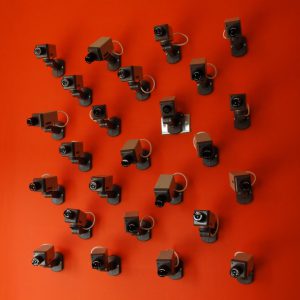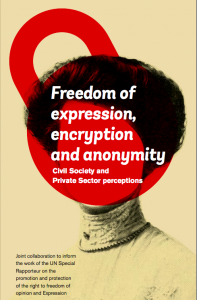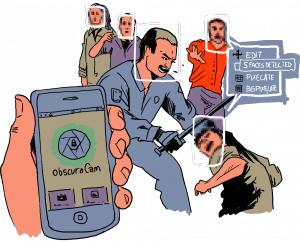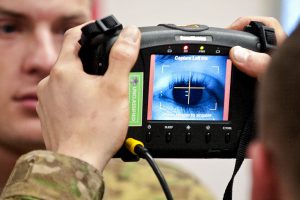From the perspective of human right defenders, encryption and anonymity is incredibly important to protect our work. But our research demonstrates that our community faces significant challenges and gaps in doing our work in the digital age. Our submission to the UN Special Rapporteur on Freedom of Opinion and Expression set out these concerns and recommendations, gathered from human rights defenders around the world, and provided input to his report presented to the UN Human Rights Council in June 2015.

Electronic surveillance is different from censorship. Its ubiquity and invisibility make it extremely difficult to detect. Surveillance quietly contaminates all spaces of our daily, connected lives, both individually and collectively. This reality is a threat to our clients, our witnesses, our work and ourselves. It is eroding our right to protest.
Our right to circulate freely and without fear in public spaces is compromised, as cameras watch us and scan our facial features, mapping our networks as they match our mobiles with our movements. The damage to our work is difficult to measure, but the risk to the lives and safety of our community of lawyers and human rights defenders is high.
Governments are rapidly regulating, normalizing and deploying an unprecedented surveillance system in most of the countries in the Global South. As provisions are dispersed within different laws and processes to hire the services are obscured under national security exceptions, civil society only becomes aware of surveillance procedures after they are established.

That’s why, with the support of the Bertha Foundation, strategic input from its Director of Legal Advocacy, Jennifer Robinson, and the collaboration of the Bertha Justice Initiative, four institutions worked together to rapidly diagnose the perceptions and knowledge that key communities currently hold about encryption and anonymity.
We also intended to identify emerging trends in state practices and regulations around anonymity and encryption in contexts where concerns about urban violence and gangs are used to advance public and political support for surveillance technologies. It was revealing to see the uniformity of global trends against anonymity and the strong support from civil society in certain countries.
We need to stop and crush the surveillance apparatus. But first: let’s understand it.
The Arab uprising was a warning to governments. While the ability to collectively organize caught the Middle East dictatorships by surprise, years later, the situation is different. Our study confirmed that governments have learnt to use connectivity for their own benefit. From Argentina to South Africa, they are acquiring equipment and sophisticated technologies to combine different databases, and track and identify dissenters in real time, anywhere. A combination of SIM card registration, CCTV cameras, biometric IDs and laws allowing authorities to use the geolocation enabled by mobile phones is a reality in most of the countries included in our survey.
Our research confirmed the rapid deployment of surveillance technologies and policies in the Global South that are often more sophisticated, pervasive, and abusive than those revealed by Edward Snowden in Western countries. Without strong judicial controls and with immediate threats justifying exceptions—such as drug cartels, terrorism, increased urban violence, and kidnappings—the surveillance state is embraced by desperate citizens, who believe they have found an immediate solution to social problems that go much deeper.
There are also increasingly alarming administrative procedures for widespread data retention, including obligations for Internet service providers to collaborate with authorities. All of this is happening in countries without national or regional legal frameworks to protect user data. Real-name registration to acquire mobile devices and services is becoming the standard practice and the criminalization of anonymity is rapidly spreading, especially in the context of protests. International programs training police and enforcement officers are cooperating extensively with governments in the Global South, providing sophisticated surveillance technologies to tackle crime at the expense of citizens’ privacy. Most of the surveillance equipment in the region and the training on how to use it are the result of cooperation agreements between police bodies across borders.
We need to be better equipped to react.
Based on our findings, it is clear that we need to accelerate the understanding of current threats among human rights lawyers. Knowledge gaps at all levels are enabling governments to deploy massive surveillance, and corporations to profit from it. Unlike fields that are more familiar to us, the provisions regulating anonymity and encryption and mass surveillance programs are buried in complexity and technical jargon.
At the same time, the academic and policy research in this area is limited and highly centered on Europe and North America. There is little systematic research on either regulations or restrictions on encryption in Latin America, the Middle East, Asia, or Africa. Despite (or perhaps because of) this lack of research, the regimes outside of Europe and North America are typically more restrictive.
What is encryption and why does it matter?
Encryption is a mathematical process of converting messages, information or data into a form unreadable by anyone except the intended recipient. It protects the confidentiality and integrity of content against third-party access or manipulation. It is the way to exercise our right to communicate in private in the digital age.
For communities at risk, anonymity and encryption are the only ways to safely communicate and express opinions.

In contexts in which dissenting voices or even just informational outlets are threatened with widespread self-censorship, independent and anonymous voices are the only ones reporting about sensitive issues. For them, the ability to communicate their ideas anonymously is a matter of life and death. Currently, the most visible example is Mexico, but there are other communities with human rights defenders denouncing corruption and exposing both corporate and governmental corrupt practices while using aliases to report. However, the problem they face is again related to a knowledge gap: few are aware that, even if they do not publish their real name online, the technologies leave them exposed. From IP identification to real-time tracking using GPS, people who think they are anonymous ignore that the sensors embedded in new technologies make them more vulnerable and identifiable. The research confirmed that states in the Global South already have sophisticated technologies to track and monitor dissident voices and that they are willing to use it at critical times, when big events or demonstrations are taking place, or when a political crisis is unfolding. For people’s full enjoyment of their right to privacy, further education and awareness about new information and telecommunication technologies is needed to advance broader encryption adoption.
For lawyers, privacy is vital for protecting attorney-client information, but encryption is hard to adopt.
Most of the lawyers interviewed were aware of and concerned about the confidentiality of their communications, both ethically and legally. Furthermore, all of them have expressed their frustration that there is no legal remedy to protect themselves and their clients against massive surveillance from their own governments and from foreign governments. While encryption could be a technical solution to stop their rights from being violated, it is another burden that potentially limits their free exercise of their profession and the right to justice and due process for their clients. It has chilling effects on freedom of opinion, as lawyers and other activists, aware of the risks of electronic surveillance, refrain from communicating in regular ways with clients and sources, browsing the web or using other technologies out of concern that their communications and activities are being read and documented by the state. For lawyers – as with journalists’ protection of sources – electronic surveillance raises fundamental ethical questions about our ability to protect client privilege, which itself is fundamental to the right to a proper defense.
Electronic surveillance is not an isolated issue for geeks. We are under attack and we must unite to defend ourselves.

As our research determined, biometric identification and tracking are on the rise. Governments are buying sophisticated equipment and using it for mass surveillance. There is no street free from surveillance cameras and the Internet of Things (that spy on us) is entering our most private spaces, from our meetings rooms to our living rooms.
We are witnessing the erosion of human rights through public-private partnerships that censor and monitor, and new tactics to impede the rights to protest and to organize, such as network shutdowns and drones which monitor activity from above.
Human rights organizations must catch up with emerging trends and threats, such as electronic surveillance, algorithmic discrimination, big data and behavioral prediction, which are all being used to enable state violence.
While our struggles for social justice and human rights have not changed, it is imperative that our tactics adapt to new and complex challenges. While we were assured that new technologies would bring a democratic space for diverse voices and invite participation of the “99 Percent,” we can now see that those were deceptive promises.
UN Special Rapporteur’s Report is conclusive: encryption and anonymity must be protected
In June, after receiving input from different civil society actors, including the Be Just Network, the UN Special Rapporteur David Kaye presented his “Report on encryption, anonymity, and the human rights framework”. The report started by highlighting the role of the Internet as the central global public forum and the need to secure the exercise of rights on the Internet.
The report explains how encryption and anonymity provide a zone of privacy to protect opinion and belief, and as such, are tools essential to exercise these rights. It highlighted especially the erosion of freedom of opinion in the digital space, which constitutes the most relevant freedom for lawyers and human rights defenders. Activism inherently involves holding strong opinions on a regular basis and to develop such opinions, lawyers and human rights defenders use a variety of digital tools, saving their views, their bookmarks, and their search and browse histories in hard drives, in the cloud and in email archives.
As lawyers, we all digitally prepare and store memoranda, papers and publications, all of which involve the creation and holding of opinions. Because our work is sensitive, there is fear of unwilling disclosure of our online activity, such as search and browsing related to a case. And as the report states – the protection of this sensitive information is integral to our freedom of opinion.
The report explains why the right to hold opinions without interference is absolute. As the report says, we are not talking about an abstract concept limited to what may be in one’s mind anymore. The right to hold opinions freely has dramatically changed in the digital age: much of it is reflected in our activity online. The report is ground-breaking, emphasizing that the rights to freedom of opinion and expression in the digital age deserve strong protection – and strong encryption is key to protecting these rights.
Some have suggested that governments should be provided ‘backdoor’ or special access to encryption. But, as the report makes clear, the universal position among technologists is that there is no special access that can be made available only to government authorities. Thus, intentionally compromising encryption weakens everyone’s security online.
Other key report findings include:
As human rights defenders, we can’t afford the luxury of passivity.
Now is the time to act and to push for the implementation of the recommendations by the UN Special Rapporteur.
The contribution of the lawyers from the Be Just network informed the report, which subsequently took regional realities into consideration. The report was written by the World Wide Web Foundation, in partnership with the Centre for Internet and Human Rights at European University Viadrina, Oficina Antivigilância at the Institute for Technology and Society (ITS) in Rio, Brazil, and Derechos Digitales Latin America. The report was kindly sponsored by the Bertha Foundation.
We hope that this contribution is just the first step towards better-informed and aware human rights activists, vigilant about rapidly emerging surveillance trends and threats.
 Renata Avila is a human rights lawyer from Guatemala. She worked as one of the lawyers representing the Nobel Peace Prize Laureate Rigoberta Menchu Tum. Involved in Internet and Human Rights research since 2009, she joined Sir Tim Berners-Lee as lead of the Web We Want campaign at the Web Foundation, dedicated to preserving and upholding human rights, responding to threats to the future of the Internet. She currently serves as a Board Member of Creative Commons Board of Directors. She is also a member of Courage Foundation advisory board, assisting whistleblowers and sources at risk and in the D-Cent board, exploring the future of decentralised technologies.
Renata Avila is a human rights lawyer from Guatemala. She worked as one of the lawyers representing the Nobel Peace Prize Laureate Rigoberta Menchu Tum. Involved in Internet and Human Rights research since 2009, she joined Sir Tim Berners-Lee as lead of the Web We Want campaign at the Web Foundation, dedicated to preserving and upholding human rights, responding to threats to the future of the Internet. She currently serves as a Board Member of Creative Commons Board of Directors. She is also a member of Courage Foundation advisory board, assisting whistleblowers and sources at risk and in the D-Cent board, exploring the future of decentralised technologies.
Follow Renata on Twitter @avilarenata
Article Tags: encryption / human rights lawyers / surveillance